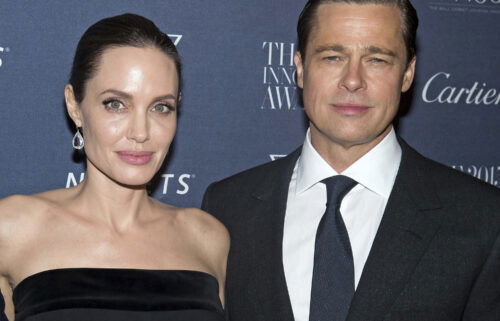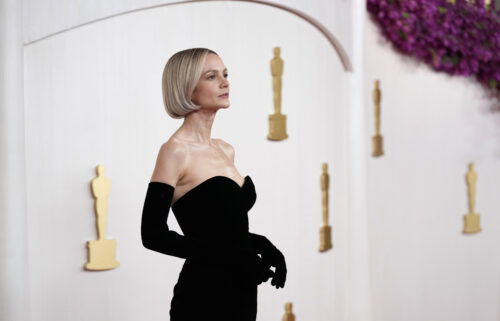Guilty Pleasures

By Associated Press
Mel B joins a campaign calling for a new UK law to bar Afro hair discrimination
LONDON | Former Spice Girl Mel B is among dozens of Black Britons urging Parliament to update the country’s equality laws and prohibit Afro hair discrimination.
In an open letter to lawmakers on Tuesday, campaigners including Mel B, singer Beverley Knight and lawmaker Paulette Hamilton called for the U.K. to introduce a law to recognize Afro hair as a protected characteristic.
“For too long, people with Afro hair have experienced unjust treatment in U.K. society and the current law is not direct enough to govern businesses, schools and the public to prevent serious harm,” read the open letter, released ahead of World Afro Day on Sunday.
“The omission of hair as a protected characteristic from the law has facilitated everyday discrimination and the normalization of Afro hair as inferior in every sphere of life,” it added.
Mel B wrote that her “big wild curly hair” drew unwanted attention for her as a child and later as a popstar.
“The very first video shoot I did as a Spice Girl for ‘Wannabe,’ the stylists took one look at my hair and told me it had to be straightened,” she said. “My big hair didn’t fit the pop star mold.”
She said she stood her ground and did not change her hair, and women still tell her how the 1990s music video inspired them to stop straightening their hair.
Racial discrimination based on hairstyles has been a topic of debate and lawsuits in the United States for some time. Earlier this year a trial took place in Texas involving a Black student who was suspended from his school for wearing twisted dreadlocks.
Texas and Michigan are among two dozen U.S. states that recently introduced laws intended to bar employers and schools from penalizing people because of hairstyles including Afros, braids, dreadlocks, twists or Bantu knots.
In July, the U.S. territory of Puerto Rico passed similar anti-discrimination legislation.
King Charles III to visit Australia and Samoa in a test of stamina after cancer diagnosis
LONDON | King Charles III has announced plans to visit Australia and Samoa next month on a trip that will span a dozen time zones and test the monarch’s stamina as he recovers from cancer treatment.
The Oct. 18-26 tour, which Buckingham Palace outlined Tuesday, marks a watershed moment for the 75-year-old king.
Charles is slowly returning to public duties after taking a break following his cancer diagnosis in early February. The decision to undertake such a long journey will be seen as a sign of his recovery.
The trip will begin in Australia before the king and Queen Camilla travel to Samoa for the Commonwealth heads of government meeting, which takes place every two years. Although the tour was first announced in July, no dates were released at that time.
Charles’ globetrotting itinerary comes as he works to shore up support for the monarchy at home and abroad two years after becoming king. The stop in Australia will mark the first time since Charles ascended the throne that he will visit one of the so-called Commonwealth realms, the 14 countries outside the United Kingdom where the monarch remains head of state.
Australian Prime Minister Anthony Albanese has a long-held aim of holding a referendum on breaking ties with the monarchy and declaring his country a republic. But those plans were put on hold after Australians overwhelmingly rejected a plan to give greater political rights to Indigenous people in a referendum held last year.
Charles will travel to Samoa as the head of the Commonwealth, a voluntary association of 56 independent nations, most of which have historic ties to the U.K.
“The king’s visit to Australia will be his majesty’s first to a realm as monarch, whilst the Commonwealth Heads of Government Meeting in Samoa is the first the King will attend as head of the Commonwealth,” the palace said in a statement. “In both countries, their Majesties’ engagements will focus on themes designed to celebrate the best of Australia and Samoa, as well as reflecting aspects of the king and queen’s work.”
National Book Award long list for young people’s literature has a poetic touch
NEW YORK | This year’s long list of National Book Awards for young people’s literature has a poetic touch.
Five of the 10 nominees announced Tuesday by the National Book Foundation are novels written in verse, including Olivia A. Coles’ “Ariel Crashing a Train” and Shifa Saltagi Safadi’s “Kareem Between,” a young Muslim’s coming-of-age story. The other novels in verse are Margarita Engle’s “Wild Dreamers,” Alicia D. Williams’ “Mid-Air” and Angela Shanté’s “The Unboxing of a Black Girl.”
Judges also selected two debut novels, Josh Galarza’s “The Great Cool Ranch Dorito in the Sky” and Ali Terese’s “Free Period,” along with Violet Duncan’s “Buffalo Dreamer,” Randy Ribay’s “Everything We Never Had” and Erin Entrada Kelly’s “The First State of Being.”
Throughout the week, the foundation will be unveiling long lists in five competitive categories, including poetry, nonfiction and fiction. The lists will be narrowed to five on Oct. 1, and winners will be announced during a Nov. 20 dinner ceremony.
Ten nominees for books in translation also were announced Tuesday, their settings ranging from Scandinavia to the Middle East to Taiwan. Three books originated in Arabic: Nasser Abu Srour’s “The Tale of a Wall,” translated by Luke Leafgren; Bothayna Al-Essa’s “The Book Censor’s Library,” translated by Ranya Abdelrahman and Sawad Hussain; and Samar Yazbek’s “Where the Wind Calls Home,” translated by Leri Price.
Translation judges also cited three books in Spanish: Layla Martínez’s “Woodworm,” translated by Sophie Hughes and Annie McDermott; Fernando Vallejo’s “The Abyss,” translated by Yvette Siegert; and Fernanda Trías’ “Pink Slime,” translated by Heather Cleary.
The other translation nominees were Linnea Axelsson’s “Ædnan,” translated from the Swedish by Saskia Vogel; Solvej Balle’s “On the Calculation of Volume (Book I),” translated from the Danish by Barbara J. Haveland; Fiston Mwanza Mujila’s “The Villain’s Dance,” translated from the French by Roland Glasse; and Yáng Shuāng-zǐ’s “Taiwan Travelogue,” translated from the Mandarin Chinese by Lin King.
—From AP reports


